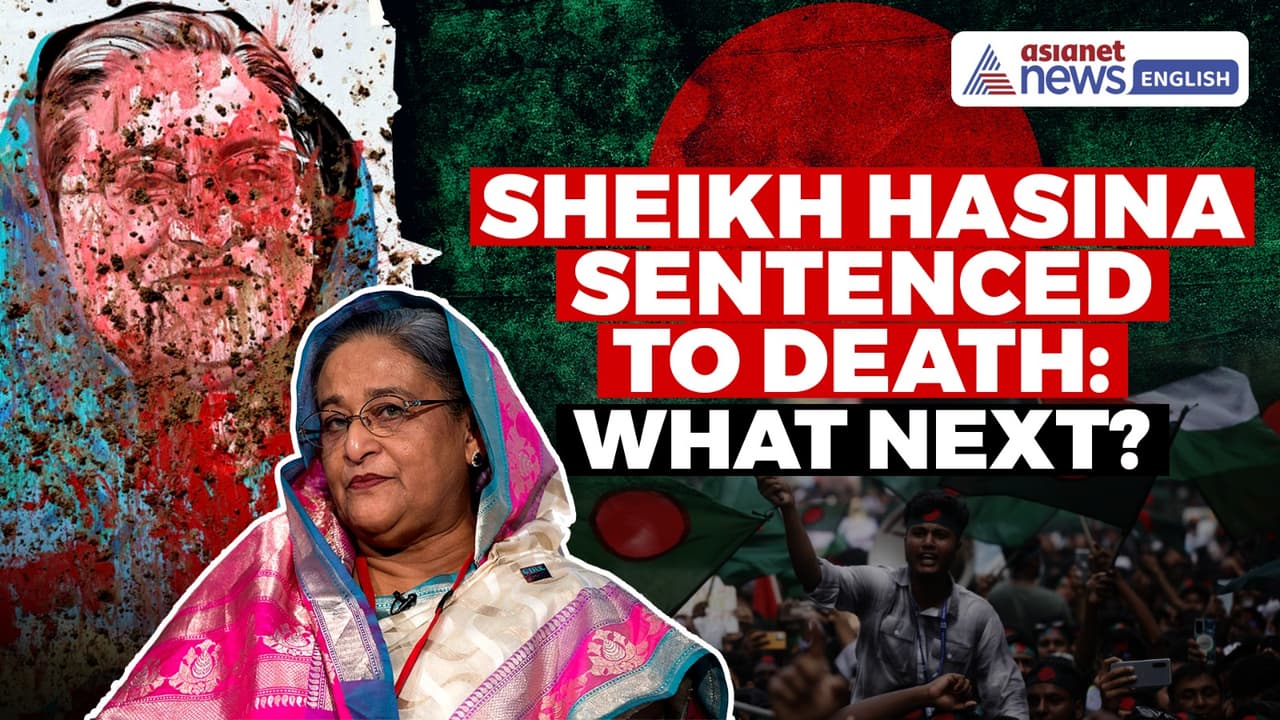Experts warn Sheikh Hasina’s death sentence could deepen Bangladesh’s political divide, trigger unrest, and complicate India’s role. Analysts say the verdict was expected, extradition is impossible, and the country faces “more difficult times ahead.”
The political landscape of Bangladesh was jolted on Monday after a Dhaka court handed former prime minister Sheikh Hasina a death sentence for crimes against humanity, marking one of the most dramatic legal and political episodes in the country’s recent history. The verdict, delivered in a courtroom packed with spectators and broadcast live across the nation, has triggered intense reactions at home and abroad—while analysts warn of a stormy road ahead.
A Verdict That Shook Dhaka
At exactly 2:44 pm local time, Judge Golam Mortuza Mozumder read the words that stunned even seasoned political observers: Sheikh Hasina, aged 78 and living in hiding in India, was “found guilty on three counts”, including incitement, order to kill, and inaction to prevent atrocities. “We have decided to inflict her with only one sentence — that is, sentence of death,” he declared.
The case stems from allegations that Hasina ordered brutal crackdowns during the student-led uprising that eventually toppled her in August 2024. The United Nations estimates that up to 1,400 people were killed, a figure that played a central role in the prosecution’s arguments.
Alongside Hasina, former interior minister Asaduzzaman Khan Kamal—also a fugitive—was given the death penalty, while former police chief Chowdhury Abdullah Al-Mamun received five years in prison after pleading guilty.
Hasina Calls Verdict “Politically Motivated”
Moments after the sentencing, Hasina issued a sharply worded statement from her undisclosed location in India, reiterating her claim that the trial was a farce.
“The verdicts announced against me have been made by a rigged tribunal established and presided over by an unelected government with no democratic mandate,” she said. “They are biased and politically motivated.”
She had previously rejected the court’s authority, refused to appoint her own defence counsel, and called the entire process a “jurisprudential joke”.
The verdict has deepened fears of escalating violence. For days, Dhaka has witnessed crude bomb attacks—petrol bombs hurled at buses, government-linked buildings, and even Christian sites. Security was visibly heightened as the judgement approached, with armoured vehicles, road checkpoints, and nearly 17,000 police personnel deployed across the capital.
Bangladesh’s interim government has also cracked down on Hasina-associated platforms and even summoned India’s envoy in Dhaka for allowing her to “grant a platform to spew hatred”.
What the Experts Are Saying: Anger, Polarisation & Diplomatic Tightrope
While the verdict marks a seismic moment for Bangladesh’s political trajectory, experts warn that it is likely to deepen rather than resolve the country’s turmoil.
“Death sentence was expected” — Anil Trigunayat
Anil Trigunayat, former Indian diplomat and distinguished fellow at the Vivekananda International Foundation (VIF), told Asianet Newsable English’s Anish Kumar that the verdict, though dramatic, did not come as a surprise.
“Since Sheikh Hasina supporters and herself feared that this is going to be a totally vindictive kind of award that will be given by the tribunal. So the death sentence had been on an expected line,” he said.
But the fallout, he warned, could be more volatile than the verdict itself.
“The fact remains that Sheikh Hasina continues to enjoy great popularity in her party in Bangladesh. That’s why we are seeing lots of discomfort among the Bangladeshis, who support her and feel that wrong has been done to her. They might be going in for more difficult time.”
Trigunayat believes that the Awami League will challenge this verdict aggressively, but for now, the country faces an uncertain, polarised phase.
“At the moment we see more polarisation and divisions in the Bangladeshi society and create more law and order problem for them,” he cautioned.
What Should India Do?
Trigunayat was clear that India must remain cautious:
“This is for Bangladeshi people and system to take care of it. India is hoping that there would be a normal transition from current transitional authority to a properly elected democratic government.”
He added that any long-term resolution must come from Bangladesh’s internal democratic processes:
“That should have taken a decision whatever they are doing. That will have more mobility. Let’s see how it plays out. India wants well for Bangladeshi people and the country to be stabilise and have a democratic government.”
“This verdict doesn’t affect extradition” — Gautam Lahiri
Gautam Lahiri, a veteran Bangladesh affairs analyst, offered a practical legal assessment to Asianet Newsable English’s Anish Kumar: the sentencing, he said, does not increase the chances of India handing Hasina over.
“I think that the International Crime Tribunal gave verdict against Sheikh Hasina of death penalty but it will have no impact on her extradition demand because India and Bangladesh have extradition treaty which says if a person is given death penalty or he or she be killed or likely to be killed then there is no chance of handing her over to them.”
He also underscored a key technical point:
“India is not a signatory to the International Crime Tribunal so that’s why India doesn’t recognise any verdict or so of ICT.”
For Hasina, this makes India one of the few places she can remain relatively insulated from immediate legal consequences.
Bangladesh’s Political Future: A Nation at Breaking Point
The timing of the verdict—barely months before the February 2026 elections—has raised serious questions about stability, democratic continuity, and whether Bangladesh can avoid sliding into prolonged strife.
Hasina’s supporters see her as a victim of political vengeance. Her critics, meanwhile, believe the judgement closes a dark chapter of authoritarian rule.
But one thing is clear: Bangladesh now stands at a crossroads where emotion, legal battles, and geopolitical undertones collide.
As experts warn, the coming months may determine not just the fate of a former prime minister—but the future of the nation itself.
